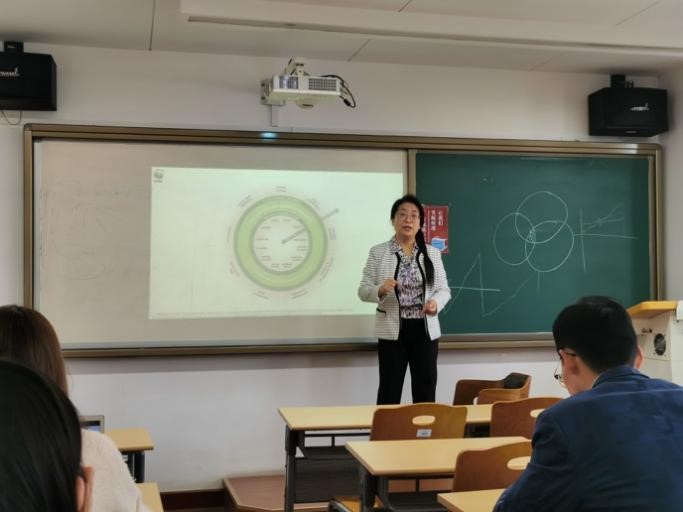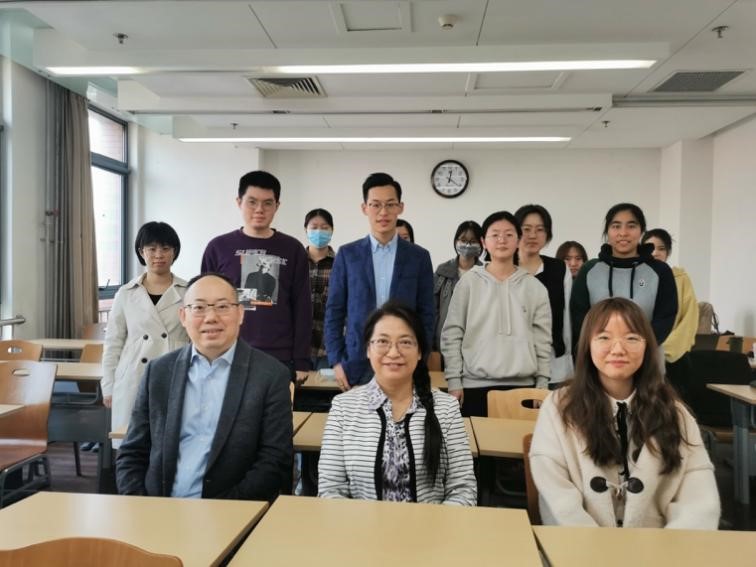At 9:00 am, April 8, 2021, Lecture series of Global Forum on Human Rights was held at A209, Research Building, Xueyuan Road Campus, China University of Political Science and Law With the theme of "Sustainable Development and Ecological Civilization: Connecting China and the World", Dr. Li Lin, Director of Global Policy and Advice of WWF International, gave a lecture to the faculty and students of the Institute of Human Rights. Prof. Zhang Wei, co-director of the Institute for Human Rights of China University of Political Science and Law, presided over the lecture.

At the beginning of the lecture, Dr. Li Lin gave us a brief introduction of her academic background and her main work at WWF. Since 2017, Dr. Li has been responsible for coordinating WWF's global policies and positions on biodiversity, promoting the focus of heads of state and leaders of international institutions on natural and ecological issues, and promoting the achievement of the Sustainable Development Goals in the global multilateral arena. Deputy Chief Representative and Executive Program Director of WWF China from 2006 to 2017, responsible for strategy formulation, project implementation and policy impact; From 2004 to 2006 she was a Senior Program Officer at WWF USA, where she was responsible for promoting the Stockholm Convention on Persistent Organic Pollutants. At the invitation of the China Commission for International Cooperation and Development (CCDC), Dr. Li was once a foreign expert of the CCDC's "Investment, Trade and Environment" and "Ecological Civilization and South-South Cooperation". She is now the foreign co-leader of the policy research project on "Global Biodiversity Conservation After 2020". Dr. Li received his bachelor's degree in engineering, master's degree in environmental policy and management, and doctor's degree in environmental policy from Beijing Institute of Technology, Lund University, Sweden, and Massachusetts State University, USA, respectively.
Next, Dr. Li Lin began today's introduction on ecology and nature conservation. First of all, Dr. Li introduced to us "why human beings need nature" from many aspects. She points out that because almost all human health and well-being depend on nature: nature is at the heart of human socio-economic models; Nature conservation is closely related to poverty reduction in human society; The safe and sustainable supply of food and food for human beings can only be guaranteed by maintaining the biodiversity of nature, which is divided into three aspects: species diversity, ecosystem diversity and gene diversity. From the perspective of water resources management and application, it must be realized through the cleaning and conservation of the ecosystem. The health of nature supports the health of human beings, and the health of biosphere is the basis of sustainable development of human beings. In the process, Professor Zhang Wei pointed out the different ecological values between East and West, as well as the Chinese tradition of sustainable development. He pointed out that since ancient times, China has put more emphasis on the concept of "harmony between man and nature" and emphasized the harmonious coexistence with nature, such as ancient non-polluting textile technology and farm manure. These traditions and technologies all embody Chinese wisdom, which is different from Western ecological values.
Then, Dr. Li Lin introduced the four parts of "the current situation of man and nature", "the future of human needs", "the theory of change" and "WWF". It shows us the influence of modern society on nature from both theoretical and practical perspectives. Such as the theory of the Anthropocene, the changing realities of the drivers, and the work of WWF, global policy and nature. During this period, Yang Yifan, Master of Human Rights Law of Grade 2020, proposed a point of view to communicate with the teacher: protecting nature is actually protecting ourselves, because the earth itself can still exist, but human as a species, if we lose the suitable living environment, it will be difficult for us to continue to survive. Therefore, natural ecological protection should emphasize the impact on human beings themselves, so as to strengthen people's concept of nature protection. Dr. Li Lin also put forward his own solutions and ideas on this point of view.
At the end of the session, Dr. Li Lin shared with the audience about issues related to nature and human rights, such as the contribution of indigenous people to ecological conservation, how to build Bridges, enhance understanding and bridge differences, and had a lively classroom exchange. Professor Zhang Wei also spoke with Dr. Li Lin about the relationship between indigenous peoples and nature and land, as well as the climate displacement caused by climate change. Zhao Mingyang, Master of Human Rights Law Class of 2020, raised a question about how WWF discovers and solves natural problems. Dong Yifan pointed out the relationship between the solution of a series of problems in ecosystem protection and the work and research of professionals. Dr. Li Lin also communicated with the students about these issues.
The lecture came to a successful end in the warm applause of the students.

Written by Yang Yifan and Shi Xuehan.